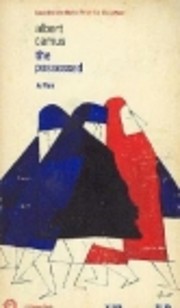

Pulse en una miniatura para ir a Google Books.
|
Cargando... Los Posesos: Obra Teatral En Tres Partes (El Libro De Bolsillo) (1959)por Albert Camus
 Ninguno Actualmente no hay Conversaciones sobre este libro.   ) )One of Camus' major plays, although I begin to wonder what the attraction was for me in high school. This is set in pre-Revolutionary Russia, with young Nicholas Stavrogin as the main character in a complicated plot. Stavrogin, who on the surface has every reason to enjoy life and be happy, is a depressed and disillusioned nihilist, wondering why most people, himself included, don't simply end their lives. Most of the characters in his circle are similarly alienated from life, with the exception of those who are actively working to destroy this society, with the intent of establishing a communistic society of all equals, with themselves in charge. Stavrogin, as we eventually learn, has valid reasons for the hidden guilt and depression which have become the core of his being. The whole story comes out in the form of a "confessional" with a religious hermit, Bishop Tihon, who seems to be the only moral and sympathetic character in the play, and the only one Stavrogin develops any real respect for - although he rejects his counsel too, in the end. The ending is a depressing and needless nod to the idea that our lives are empty and joyless, despite our best efforts, and death is the only escape. Incidentally, I do appreciate the meaning of the title. It comes from the biblical story about a herd of sheep who were possessed by a plague of demons, and ran over a cliff to their deaths. Here, the sheep seem to be most of the characters of the play, Communism (although it is never mentioned by name) the demons, and the shepherds Mother Russia. The title alone indicates a glimmer of hope here, in that once the sheep and the demons that drive them are destroyed, humanity will again have a chance at peace and happiness. sin reseñas | añadir una reseña
Pertenece a las series editorialesHaagse Comedie (12)
No se han encontrado descripciones de biblioteca. |
Debates activosNingunoCubiertas populares
 Google Books — Cargando... Google Books — Cargando...GénerosSistema Decimal Melvil (DDC)842.914Literature French French drama 1900- 20th century 1945-1999Clasificación de la Biblioteca del CongresoValoraciónPromedio: (3.54) (3.54)
¿Eres tú?Conviértete en un Autor de LibraryThing. |
|||||||||||||||||||||||||||||||||||||||||||||||||||||||||||||||||||||||||||||||||||||||||||||||||||||||